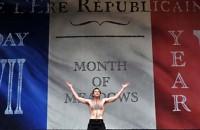Liberty
September arrives and with it the final chapter in this year's season at Shakespeare's Globe. Like many closing thoughts in a literary work, this play should have had the ingredients to have us gagging for more, but strangely it fell rather flat.
The main culprit for the lack of lustre in 'Liberty' is largely to be found in the lengthy opening scene - a picnic - where we're introduced to the main characters. Unfortunately, this rambling introduction felt interminably long and unnecessary, and after that it was largely an uphill struggle to completely engage the audience.
'Liberty' is set in the early years of the French Revolution (1789-1799) when ideals such as freedom, equality and fraternity briefly held the political stage. It is based on the novel 'Les Dieux ont soif' (The Gods are Thirsty) written in the early twentieth century by Anatole France. In general, the play seems fairly faithful to the historical events - though I do not claim to be anything like an expert on this tumultuous period in France.
The play focuses on a group of friends headed-up by Gamelin (David Sturzaker) who's a fervently idealistic young artist. However, when he's appointed as a magistrate, his life takes a sudden and irreversible turn as power changes idealism into cruelty. One-by-one Gamelin's friends all fall foul of the authorities during a reign of terror that leads to many people being summarily executed by the guillotine on charges that could be proved merely on 'moral' grounds rather than factual evidence.
David Sturzaker provides a youthful and handsome lead as Evariste Gamelin. Sturzaker should be comfortable at the Globe since he's already been in a handful of Shakespearian productions there. And he copes well with the role, though I don't think we really got the true sense of a man making the nasty transformation from caring idealist to 'hanging judge' even if he did persuade us of his increasing obsession.
Glyn Maxwell's script is written in verse, though thankfully not the rhyming variety. However, it lacks the ability to move us significantly or to convey the sense of real terror that infected post-revolutionary France. There are snippets of humour, for example a rather in-joke about 'The National' being closed down, but it's certainly not a play with many laughs.
Given the turbulent nature of the period and the fast-moving chain of events that followed from the French Revolution, it's surprising that this play didn't have us on the edge of our seats - or benches - for the duration. But it didn't. At a little short of 3 hours, there was enough time to do justice to the subject, but I suspect it needed a bigger company and different characters to make it really work. And, indeed, it might well have been better if pruned, particularly the opening scene which almost had me 'nodding off' in spite of the chilly breeze.
The Globe hasn't quite got to grips yet with new, historical plays. Last year, it presented 'We The People', about the American constitution. That play had a very large cast, but was hampered by the repetitive voting which formed the central core of the piece and induced instant coma. In contrast, 'Liberty' has a relatively small cast, but would have benefited from a much bigger one. Interestingly, there's a description in the programme for 'Liberty' of the revolutionary dance, the Carmagnole, taken from Dickens' 'Tale of Two Cities'. Comparing that description with 'Liberty' is like comparing chalk with cheese. 'Liberty' never gets close to the unrestrained terror that Dickens' description of the Carmangole embodies, and which must have been the central experience for the population of the time. Now I'm not for unrestrained blood and gore just for the sake of it, but here there was just insufficient realism. For example, when prisoners appeared from below stage, they seemed as though they'd just been kitted-out from a jumble sale rather than having been languishing in a dirty, rat-infested prison - their costumes were just too clean.
The audience - a little on the thin side on a chilly September evening - seemed rather muted and underwhelmed. This is not the norm for this venue, where audiences are generally highly receptive and enthusiastic. Of course, this was a more serious play, but I sensed that many of those challenging their endurance by standing in the yard were not entirely certain what was going on, and expected something very different.
Overall, though, the Globe's Totus Mundus season has been extremely enjoyable and watchable, with a variety that has to be both welcomed and applauded. It's just a pity that it had to end with what turned out to be something of a whimper rather than a roar.
(Peter Brown)
Production photo by Andy Bradshaw
Originally published on
